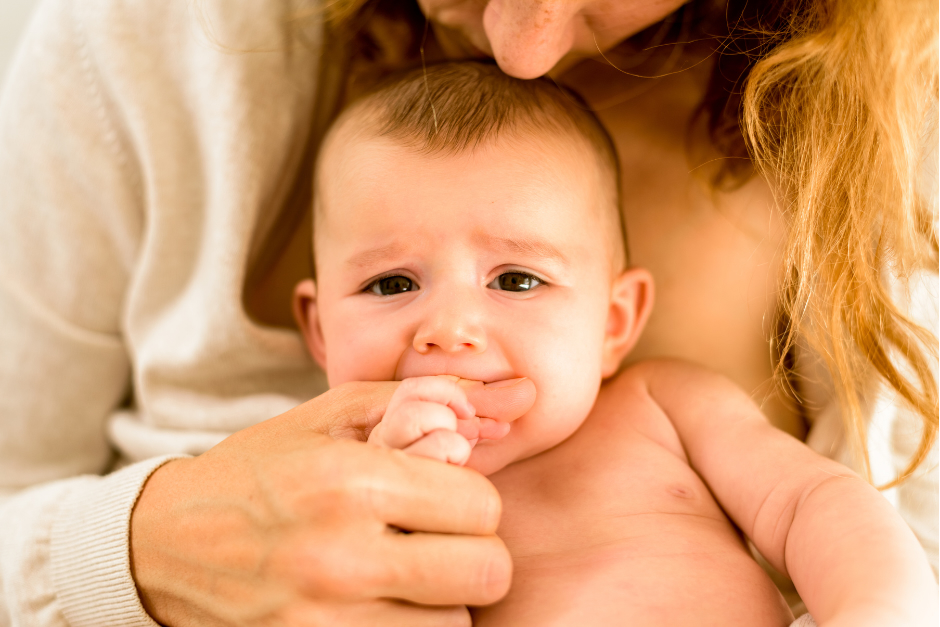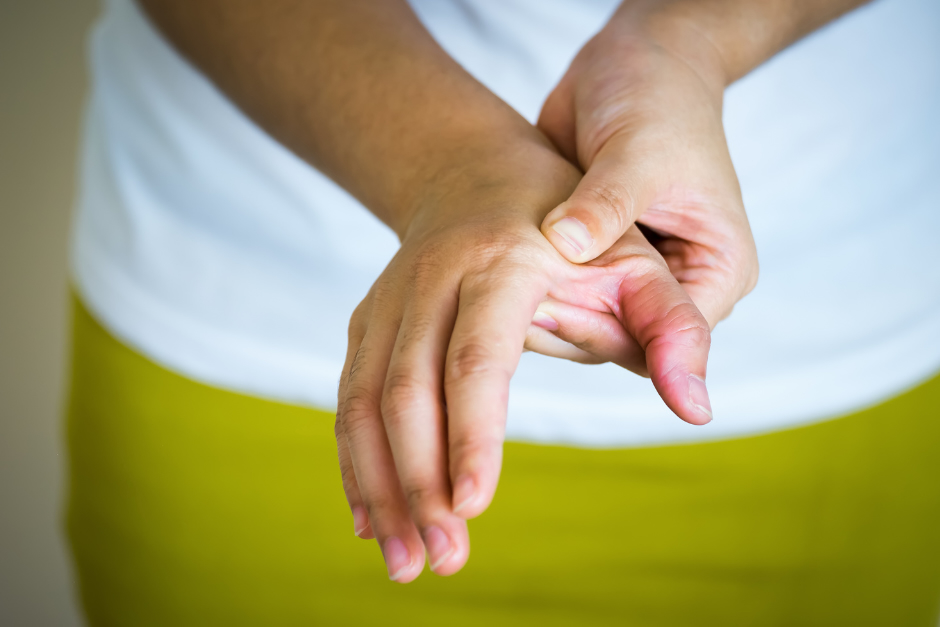How to Treat Mother's Thumb
Are you a new mum experiencing pain and discomfort in your thumb? If so, you may be suffering from a condition known as Mother's Thumb. If you've never heard of this condition, it might be something you become more familiar with as you progress through your pregnancy.
Mother’s Thumb typically starts causing problems during the third trimester, when you are more prone to fluid retention. This can cause compartments within the hands and wrists to become swollen, which can result in one — or both — of two conditions: carpal tunnel syndrome and de Quervain's tenosynovitis, the medical term for Mother's Thumb.
This common ailment is caused by repetitive movements such as lifting and carrying your baby, resulting in inflammation of the tendons around the base of the thumb.
Following pregnancy, you are just as likely — if not even more so — to develop these conditions thanks to the constant lifting of your newborn.
Fortunately, there are various treatment options available to alleviate the symptoms and help you get back to enjoying motherhood. In this article, we will explore effective ways to treat Mother's Thumb and provide practical tips for managing this condition while caring for your little one.

Causes of Mother's Thumb
De Quervain's tenosynovitis is characterized by pain and inflammation in the tendons located at the base of the thumb. While it can be uncomfortable and limit your daily activities, understanding its causes can help prevent and manage this condition effectively.
1. Repetitive Movements
The primary cause of Mother's Thumb is repetitive movements that strain the tendons in the wrist and thumb area. Activities such as lifting heavy objects (including babies), repeatedly gripping or twisting motions while breastfeeding or bottle-feeding, carrying car seats, or constantly using smartphones for long periods can all contribute to it.
2. Hormonal Changes
During pregnancy and postpartum recovery, women experience hormonal changes that affect their ligaments' flexibility and elasticity. These changes may lead to an increased risk of developing Mother's Thumb due to weakened support around the wrist area. This hormonal factor often exacerbates the impact of repetitive movements on tendon inflammation.
3. Poor Ergonomics
New mothers often spend extended periods holding their infants in various positions without proper awareness of ergonomics. Incorrect positioning while breastfeeding or cradling a baby can strain the tendons in the thumb region, leading to inflammation over time.
4. Pre-Existing Conditions
Individuals with pre-existing conditions related to joint problems or arthritis may be more susceptible to developing this condition due to their weaker musculoskeletal structure.
5. Genetics
Studies suggest that certain genetic factors might make some individuals more prone to developing Mother's Thumb than others.

Tips for Preventing Mother's Thumb
- Maintain Proper Posture: Maintaining proper posture while feeding or carrying your baby plays a crucial role in preventing mother's thumb. Ensure that your back is straight, shoulders relaxed, and wrists are aligned with your forearms. Avoid bending your wrists at extreme angles or putting excessive pressure on them while lifting or carrying your child. Using ergonomic pillows or supports can also provide added comfort and reduce strain on your wrists.
- Take Frequent Breaks: Continuous repetitive motions like breastfeeding or bottle-feeding for extended periods can put stress on the tendons in your wrists and increase the likelihood of developing mother's thumb. Make it a point to take frequent breaks during feeding sessions to rest your hands and relax the muscles around the wrist area. Gentle stretching exercises during these breaks can also help alleviate any tension buildup in these areas.
- Strengthen Your Hand Muscles: Regularly engaging in hand-strengthening exercises can significantly reduce the risk of developing Mother's Thumb by promoting flexibility and increasing muscle endurance around the affected area. Simple exercises like squeezing stress balls or using resistance bands specifically designed for hand workouts can work wonders for strengthening hand muscles.
- Use Assistive Devices: Incorporating assistive devices into your daily routine can be a game-changer when it comes to preventing this condition. Utilize tools like baby carriers or slings that distribute the weight of your baby evenly, reducing strain on your wrists and hands. Additionally, ergonomic feeding pillows and bottle holders can help maintain proper hand alignment during feeding sessions.
Diagnosis and Treatment of Mother's Thumb
Recognising the signs of Mother's Thumb is crucial for early diagnosis and effective treatment.
Symptoms of Mother's Thumb
Symptoms of this aggravating conditions include:
Pain at Base of Thumb
A dull or sharp pain near the base of your thumb is one of the primary indicators.
Swelling or Tenderness
The affected area may become swollen, tender to touch, or warm due to inflammation.
Difficulty Grasping Objects
Gripping objects becomes challenging due to weakened grip strength caused by pain.
"Sticking" Sensation
You may experience a sensation where your thumb feels stuck when attempting movements like pinching or grasping.

How to Treat Mother's Thumb
Rest and immobilization comprise one of the initial steps in treating Mother's Thumb. This enables the inflamed tendons to heal by reducing strain on them. Using a splint or brace can provide support while limiting movement during daily activities.
Applying ice packs or cold compresses on the affected area helps reduce swelling and provides relief from pain. Ice therapy should be done for around 15-20 minutes several times a day, ensuring you wrap the ice pack in a cloth before applying it directly to your skin.
Nonsteroidal anti-inflammatory drugs (NSAIDs) such as ibuprofen or naproxen may be recommended by healthcare professionals to reduce both pain and inflammation associated with Mother's Thumb. However, you should always consult your doctor before taking any medication.
A women's health physiotherapist can provide a treatment plan designed to strengthen the muscles surrounding the thumb and improve flexibility without aggravating symptoms further. Treatment techniques include:
- Therapeutic ultrasound
- Kinesiotaping to support the wrist and encourage healing.
- Stretching exercises that typically involve gentle movements, range-of-motion stretches, and gripping exercises using resistance bands or small objects like stress balls.
- Ergonomic assessment and advice on your breastfeeding position.
Making some lifestyle changes can aid recovery from Mother's Thumb effectively:
- Avoiding repetitive thumb movements that exacerbate symptoms.
- Using proper ergonomic techniques while performing tasks that involve grasping or lifting.
- Using assistive devices, such as bottle holders or diaper changers, to reduce strain on the thumb and wrist.
In severe cases where conservative treatments fail to provide relief, a healthcare professional may recommend corticosteroid injections. These injections help reduce inflammation and provide temporary pain relief. However, they are typically used sparingly due to potential side effects.
Surgery to treat Mother's Thumb is considered a last resort, and you should expect to find an effective treatment before resorting to surgery. Consulting a women's physio early can help prevent the need for severe intervention later.
Book A Women's Physio Consultation Now
For advice on treating Mother's Thumb or another pregnancy-releated women's health problem, call Magdalena on 07877 017 936 or drop PelviCare an email. Alternatively, you can book an appointment online.
PelviCare Women's Health Physiotherapy is located in Greenwich, London, serving women across South London, East London, Essex, Kent and beyond.
Recommended Articles:
Pregnancy-Related Carpal Tunnel Syndrome
The 5 Most Common Pregnancy Problems & Their Solutions